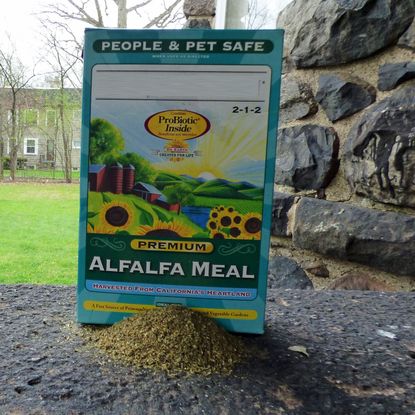Fertilizing With Alfalfa Meal: How To Use Alfalfa Meal In The Garden

If you've ever been around horses, you know they love alfalfa meal as a tasty treat. Organic gardeners know it for another reason: it's a great natural fertilizing agent for blooming plants. Alfalfa meal fertilizer contains trace elements that help flowering perennials and shrubs to bloom faster and longer during the season. Read on for more alfalfa meal gardening info for an efficient soil conditioner as well as a boost to your flowering plants.
Fertilizing With Alfalfa Meal
What is alfalfa meal? This organic garden booster is a product of fermented alfalfa plant seeds. It's light and airy looking and has a pleasant, earthy smell. Alfalfa meal generally comes in large quantities, as you use it generously around all your blooming perennials and shrubs. Although you may be able to find alfalfa meal at some larger garden centers, it may be easier and less expensive to get at feed and animal stores. If you're near a rural area or if you have an all-purpose animal supply house in the area, check there. Contact the nearest large veterinarian's office as another source for alfalfa meal, or clues to where you can find it.
How to Use Alfalfa Meal in the Garden
There's no great trick to learning how to use alfalfa meal. The amount you use is important, but it's more likely that you won't use enough rather than using too much. Sprinkle about 2 cups (473 ml.) of the meal around rose bushes or other shrubs of that size. Add a generous line of the meal alongside hedges and broadcast it quite heavily among large plantings. Work the alfalfa meal into the soil with a rake, then water the plants as usual. Do the first application in the spring, when your plants begin to show new growth. Those plants that only bloom once in the year don't need any more meal added. If you have blooming flowers that continue to show off during a longer season, add another application every six weeks. Alfalfa meal is an alkaline substance, which means it shouldn't be used with plants that prefer an acid soil, such as camellias or rhododendrons. It can be quite powdery, so wear a face mask when you spread it in the garden. Finally, transfer any leftover alfalfa meal to a secure metal or heavy plastic storage container. Mice love the meal in large quantities and will chew through any bags left in storage.
Gardening tips, videos, info and more delivered right to your inbox!
Sign up for the Gardening Know How newsletter today and receive a free download of our most popular eBook "How to Grow Delicious Tomatoes."